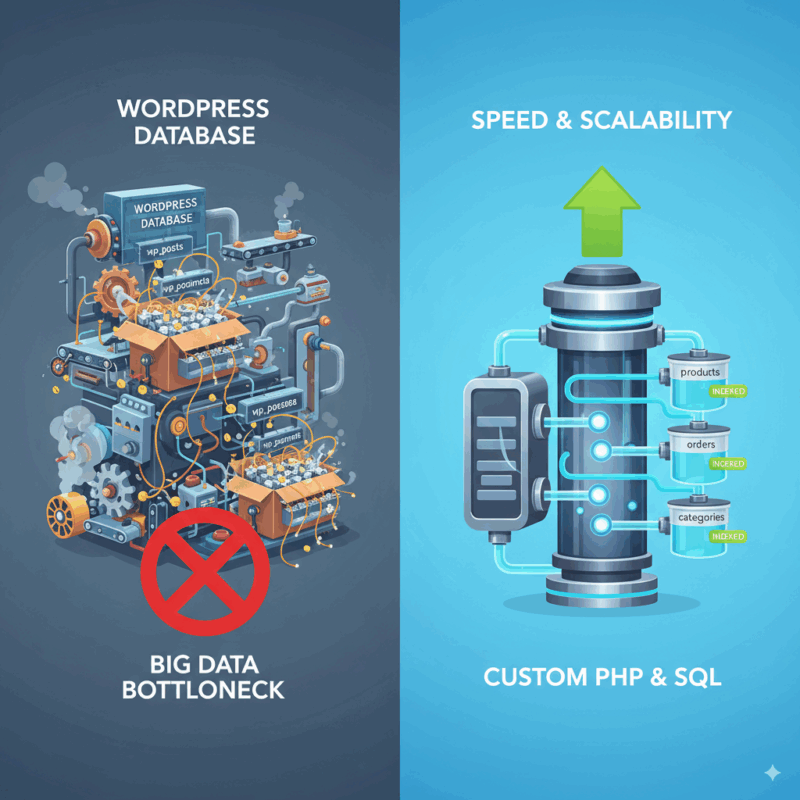MRC Marketing Consultants
Why WordPress Struggles With Big Data Sites | MRC Marketing Consultants
WordPress powers a colossal portion of the internet, and for good reason. It’s user-friendly, incredibly flexible, and backed by a massive community. For blogs, corporate websites, and small online stores, it’s often the perfect tool. However, when the conversation shifts to “big data”—sites managing tens of thousands of products, millions of user records, or complex relational data—the picture changes.
The very architecture that makes WordPress so adaptable for the masses becomes a significant obstacle, leading to sluggish performance and scalability headaches. This is where we need to look beyond the popular choice and ask if it’s truly the right tool for a heavy-duty job.
Build Your Website With SugarCode
The WordPress Database: A Big Data Bottleneck
At the heart of WordPress’s performance issues with large datasets lies its database schema. The system is famously built around two core tables: `wp_posts` and `wp_postmeta`. The `wp_posts` table is a “one-size-fits-all” container. It doesn’t just hold your blog posts; it stores pages, menu items, product listings, image attachments, and virtually any other content type you can imagine. This design offers great flexibility for plugins and themes but creates a massive, singular chokepoint. As your site grows, this table becomes incredibly bloated, and every query has to sift through a vast amount of irrelevant data to find what it needs.
The problem is compounded by the wp_postmeta table, which handles all the custom data associated with a post. WordPress uses a key-value pair system, meaning for every single piece of metadata—like a product’s price, its color, or its SKU—a new row is added to this table. An e-commerce site with 10,000 products, each having 15 attributes, would result in 150,000 rows in the wp_postmeta table alone. This structure makes it extremely inefficient to run complex queries, such as “show me all large, blue shirts under R360,” as the database must perform resource-intensive JOIN operations across these gigantic tables.
Ultimately, this database architecture simply wasn’t designed for the demands of big data. The result is inevitably slow query times, which translate directly to a poor user experience with long page loads and laggy search results. As the data grows, the server load increases exponentially, forcing site owners into expensive hosting plans just to keep the site functional. While caching can help mask some of these issues on the front end, any dynamic, data-driven functionality will expose the underlying weakness. For applications where speed and data integrity at scale are critical, this bottleneck is a deal-breaker.
How Custom PHP and SQL Deliver Better Speed
When you move away from a general-purpose CMS and opt for a custom solution with PHP and a bespoke SQL database, you gain the single most important advantage: control. Instead of forcing your data into a pre-defined, generic structure, you can design a database schema that is perfectly tailored to your application’s specific needs. For an e-commerce site, this means creating dedicated tables like `products`, `categories`, `orders`, and `customers`. This logical separation of data is the first and most crucial step toward building a high-performance system.
With a custom database schema, you can optimize for speed in ways that are impossible within the standard WordPress framework. You can define precise data types for each column, create efficient relationships between tables, and, most importantly, apply strategic indexing. An index on a product_price or product_color column allows the database to find relevant records almost instantly, without scanning the entire table. A complex query that would bring a WordPress site to its knees can be executed in milliseconds on a well-designed custom database because it’s built for that specific task.
Of course, building a custom PHP and SQL application requires more upfront development time and expertise than spinning up a WordPress site. However, this initial investment is a strategic trade-off. For a data-intensive website, the long-term benefits are immense: superior performance, a snappier user experience, greater scalability, and often lower hosting costs due to more efficient resource usage. You are essentially building a precision tool for a specific job, whereas WordPress is more like a Swiss Army knife—versatile for many tasks, but not the best choice when you need to perform a specialized function at a massive scale.
In conclusion, while WordPress is an exceptional platform that has democratized web publishing, its architectural choices make it ill-suited for the world of big data. Its flexible but inefficient database structure creates a performance bottleneck that simply cannot be overcome at scale. For projects that anticipate handling large volumes of users, products, or complex relational data, the custom route using PHP and a purpose-built SQL database is not just a better option; it’s a fundamental requirement. By investing in a tailored solution, you build a foundation that is fast, scalable, and ready to grow with your data, ensuring a successful and performant application for the long haul.

